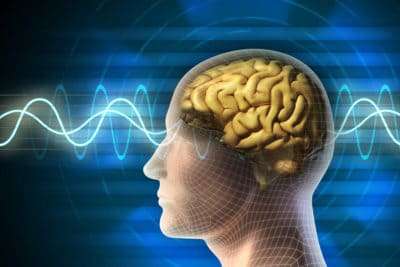Quotes
Werner Heisenberg Quotes & Biography
Werner Heisenberg was a German philosopher and physicist who made important contributions to the field of quantum mechanics.
He came up with a way to explain quantum mechanics in terms of matrices. For this, the Nobel Prize for Physics in 1932 was given to him.
Most people agree that Heisenberg was one of the most important people in nuclear physics, particle physics, and quantum field theory. Keep reading these amazing Werner Heisenberg quotes and biography.
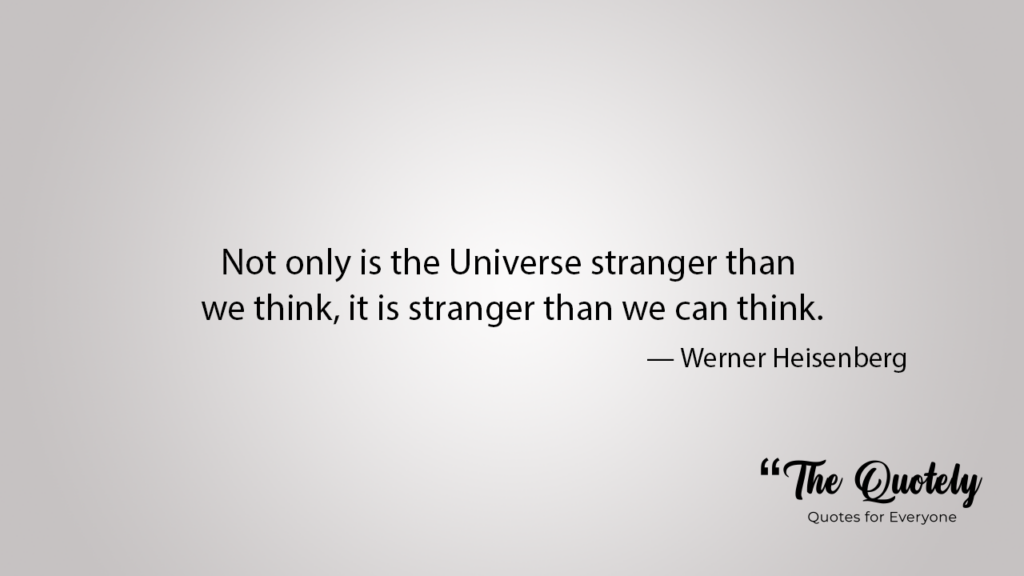
- “Not only is the Universe stranger than we think, it is stranger than we can think.” ― Werner Heisenberg
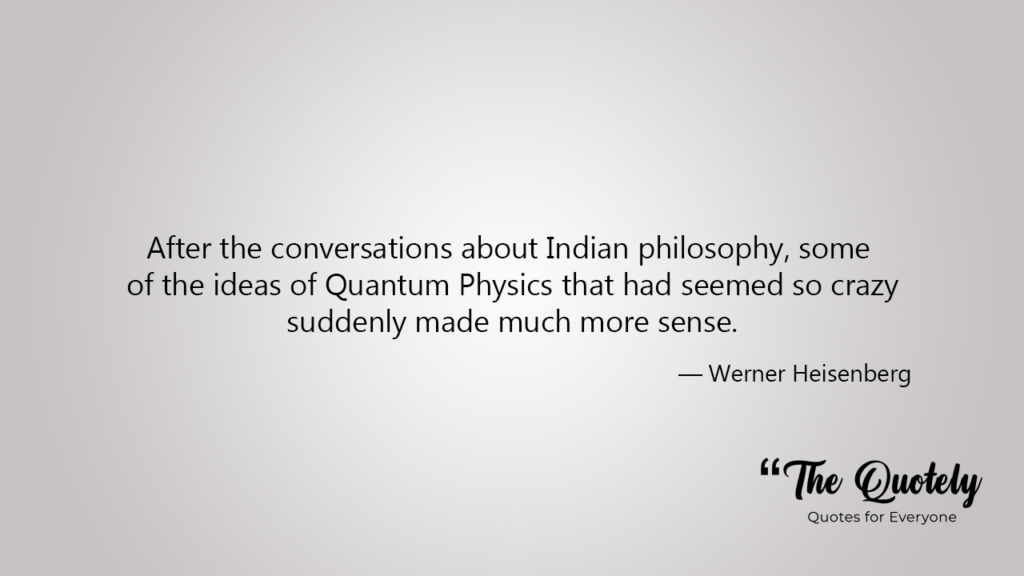
- After the conversations about Indian philosophy, some of the ideas of Quantum Physics that had seemed so crazy suddenly made much more sense. — Werner Heisenberg
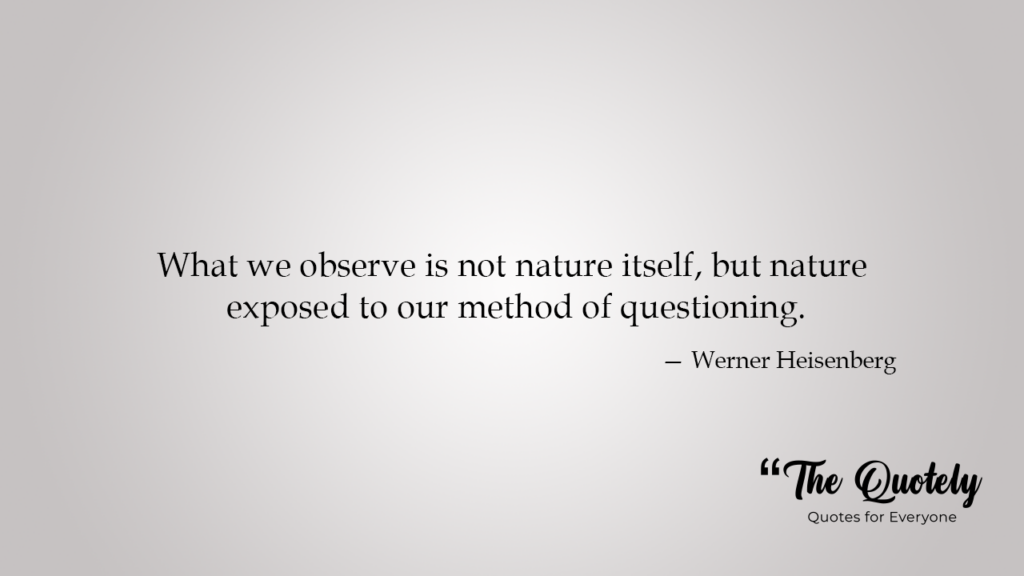
- “What we observe is not nature itself, but nature exposed to our method of questioning.” ― Werner Heisenberg
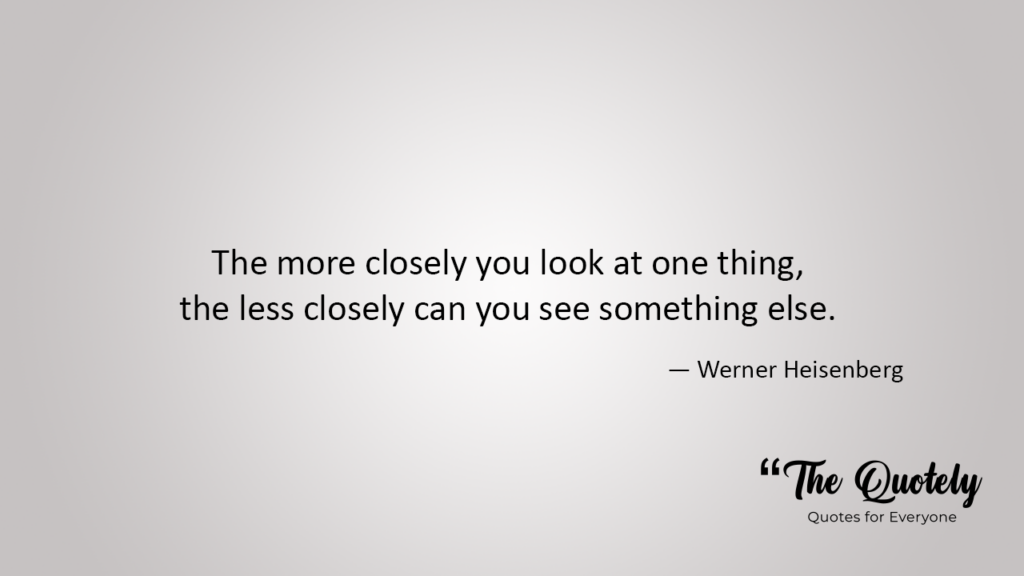
- The more closely you look at one thing, the less closely can you see something else. — Werner Heisenberg
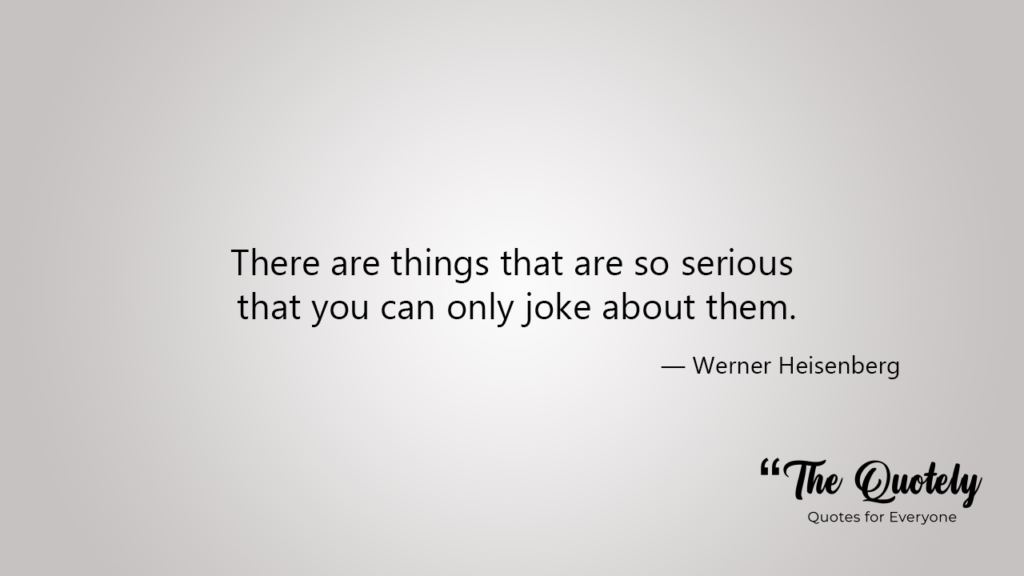
- “There are things that are so serious that you can only joke about them.” ― Werner Heisenberg
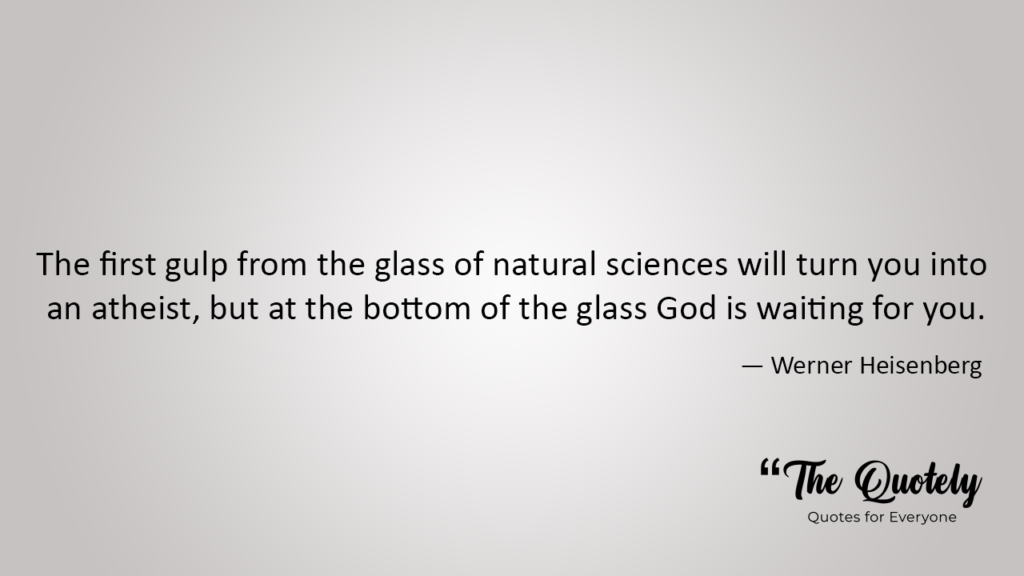
- “The first gulp from the glass of natural sciences will turn you into an atheist, but at the bottom of the glass God is waiting for you.” ― Werner Heisenberg
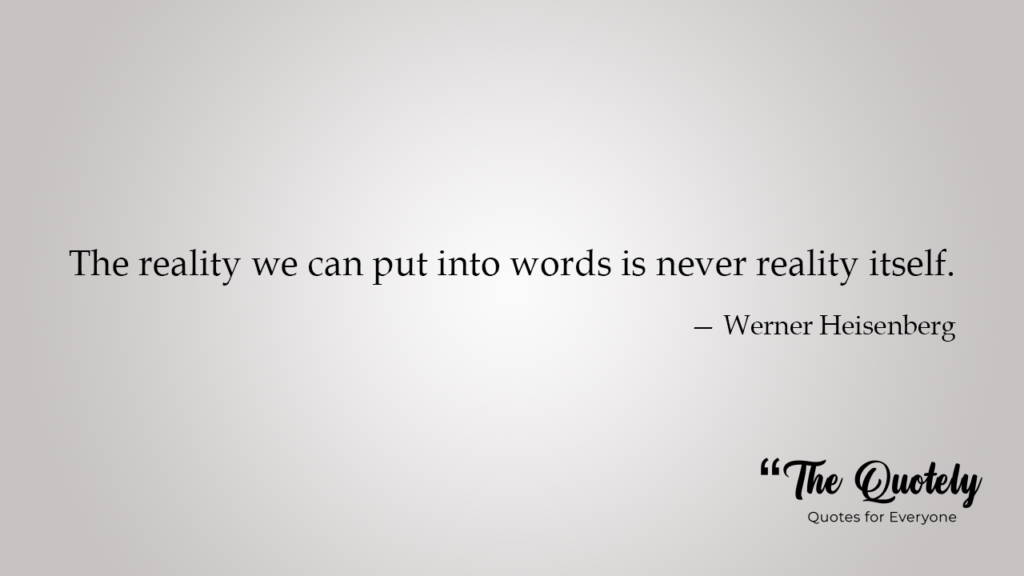
- “The reality we can put into words is never reality itself.” ― Werner Heisenberg
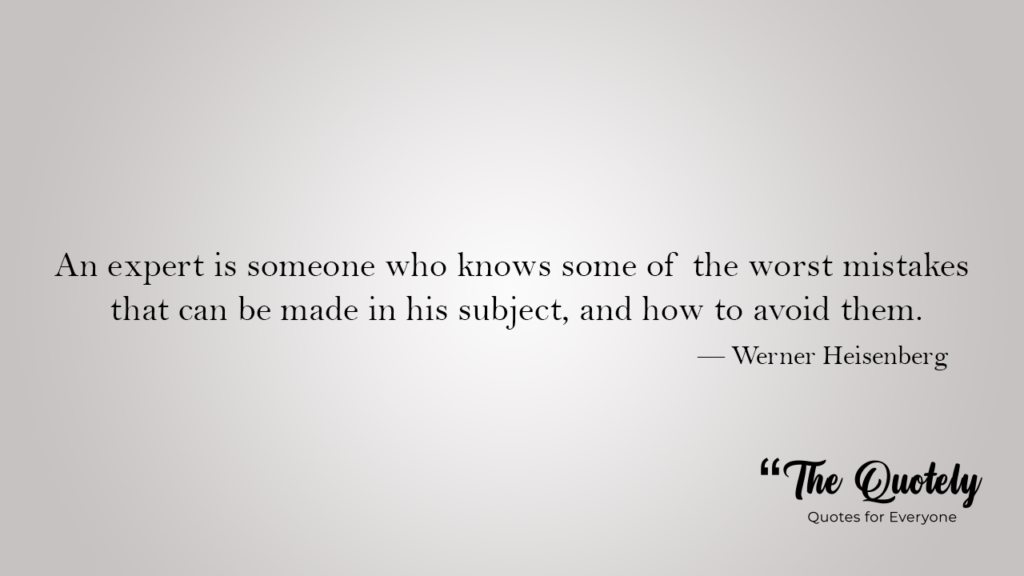
- “An expert is someone who knows some of the worst mistakes that can be made in his subject, and how to avoid them.” ― Werner Heisenberg
Table of Contents
Werner Heisenberg quotes glass

- “Whenever we proceed from the known into the unknown we may hope to understand, but we may have to learn at the same time a new meaning of the word ‘understanding.” ― Werner Karl Heisenberg
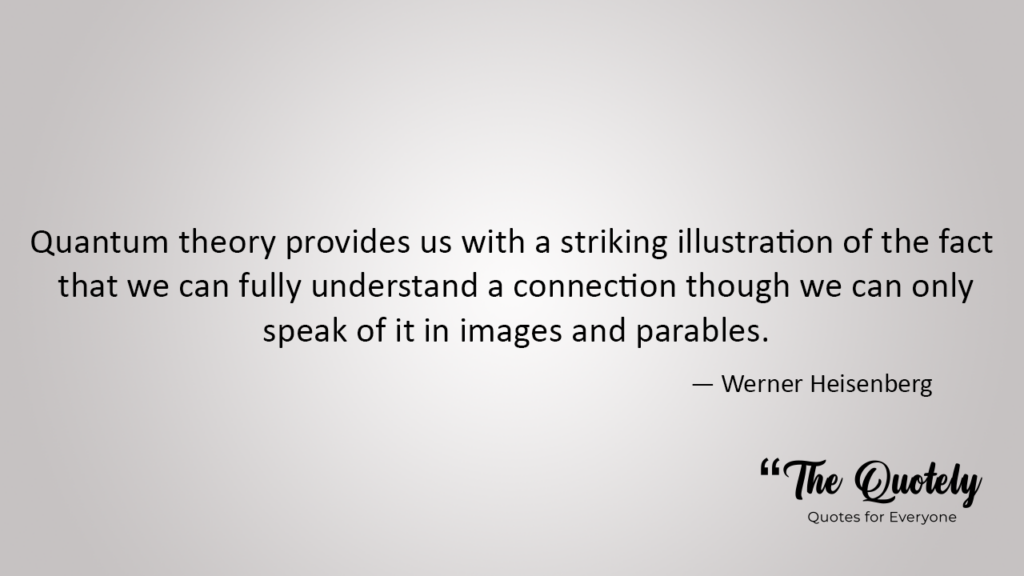
- “Quantum theory provides us with a striking illustration of the fact that we can fully understand a connection though we can only speak of it in images and parables.” ― Werner Heisenberg
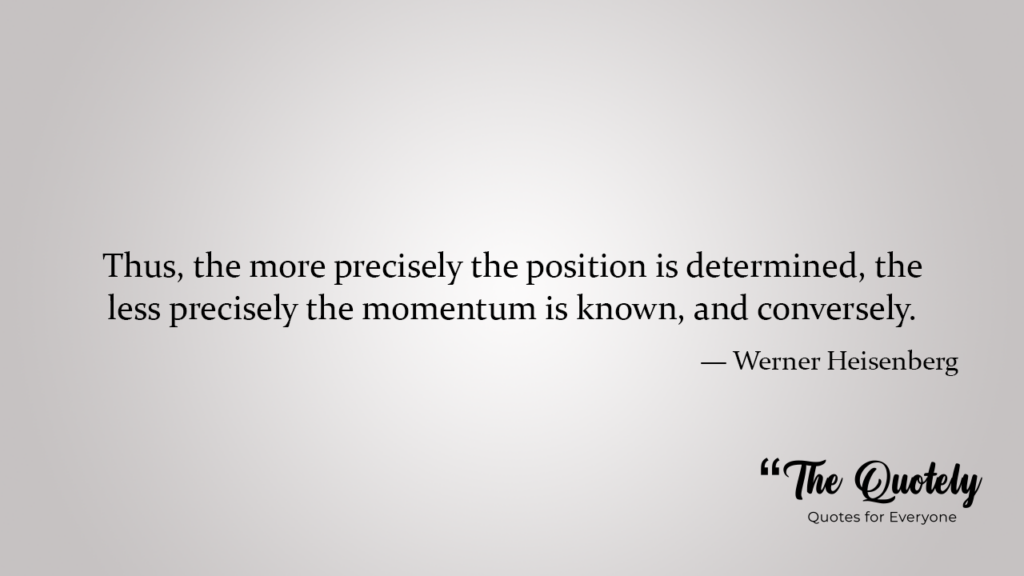
- Thus, the more precisely the position is determined, the less precisely the momentum is known, and conversely. — Werner Heisenberg
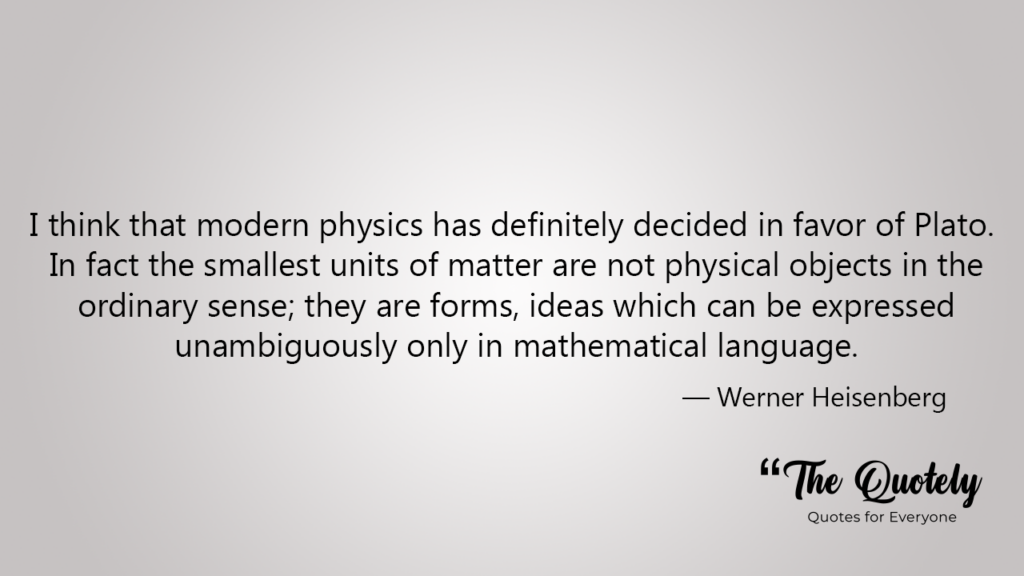
- “I think that modern physics has definitely decided in favor of Plato. In fact, the smallest units of matter are not physical objects in the ordinary sense; they are forms, ideas which can be expressed unambiguously only in mathematical language.” ― Werner Heisenberg
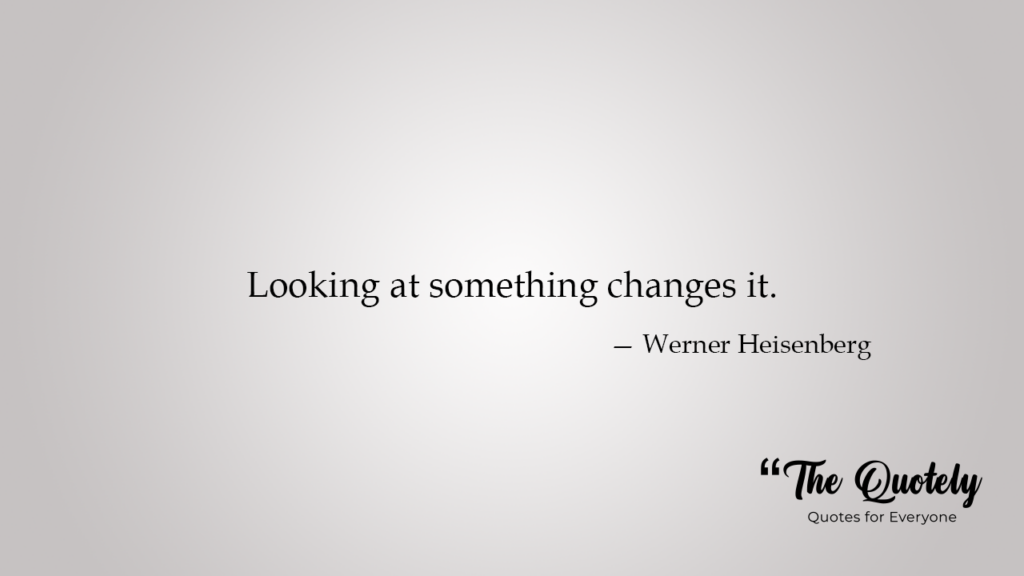
- Looking at something changes it. — Werner Heisenberg
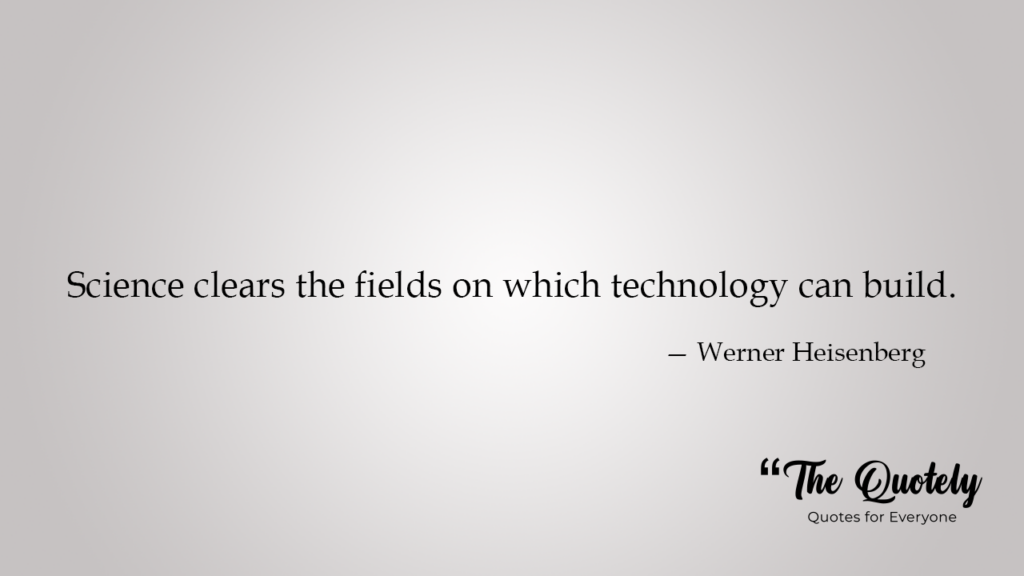
- Science clears the fields on which technology can build. — Werner Heisenberg
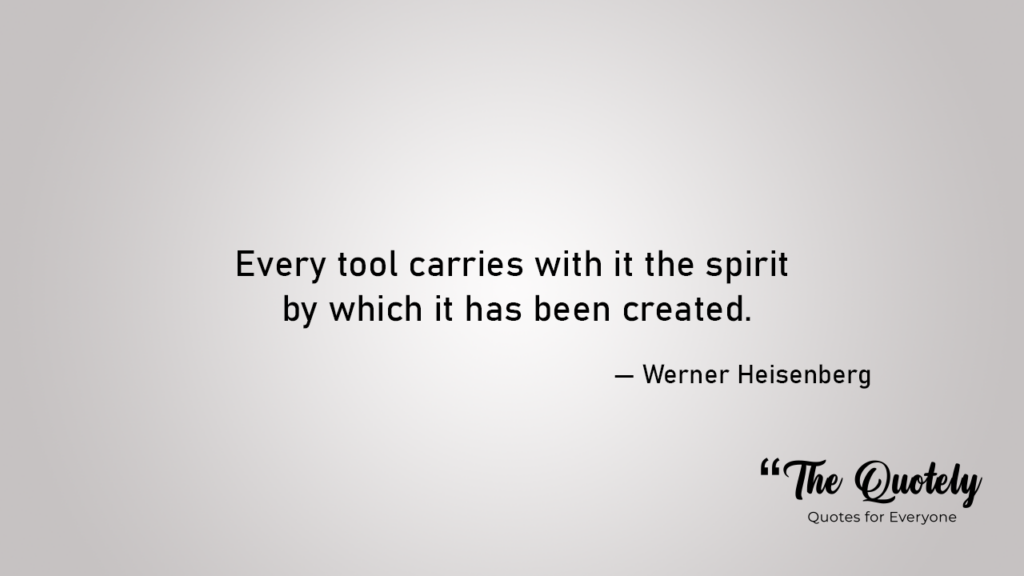
- Every tool carries with it the spirit by which it has been created. — Werner Heisenberg
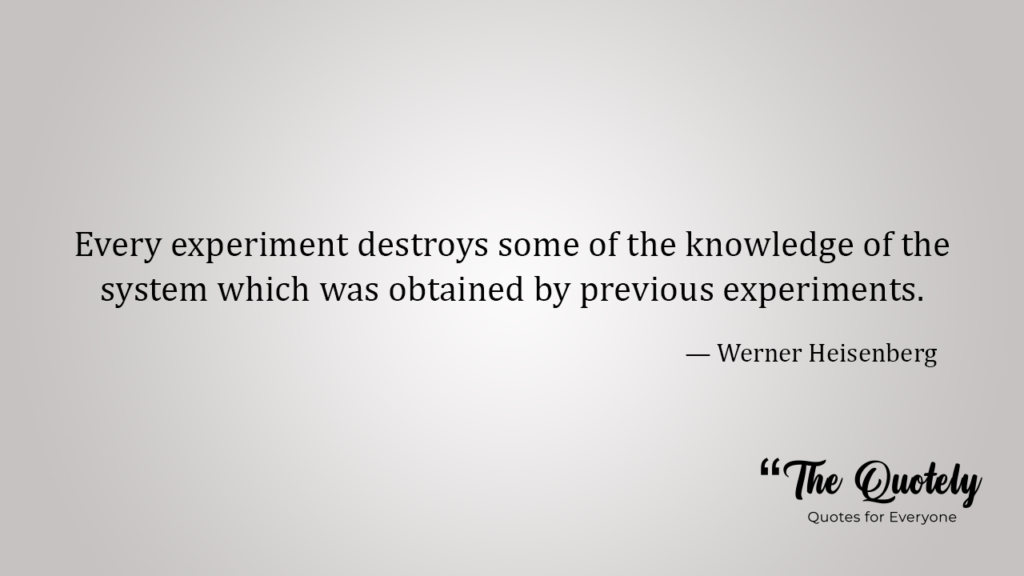
- Every experiment destroys some of the knowledge of the system which was obtained by previous experiments. — Werner Heisenberg
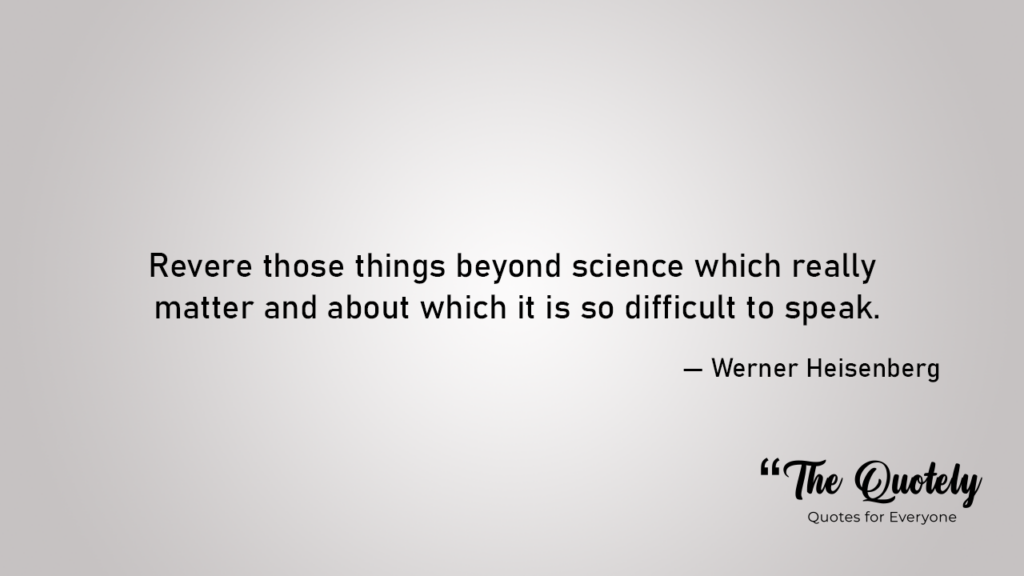
- “Revere those things beyond science which really matter and about which it is so difficult to speak.” ― Werner Heisenberg
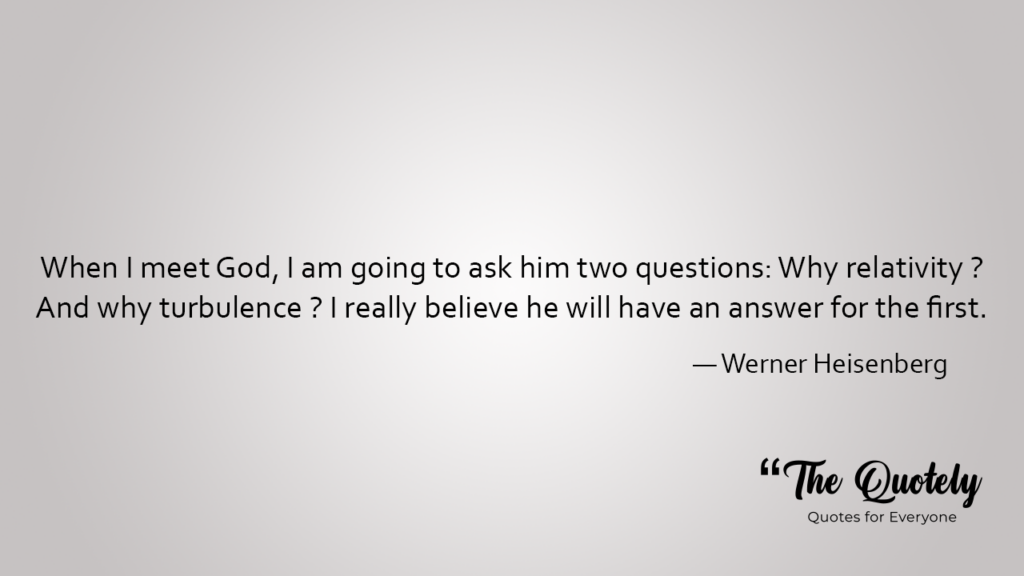
- When I meet God, I am going to ask him two questions: Why relativity? And why turbulence? I really believe he will have an answer for the first. — Werner Heisenberg
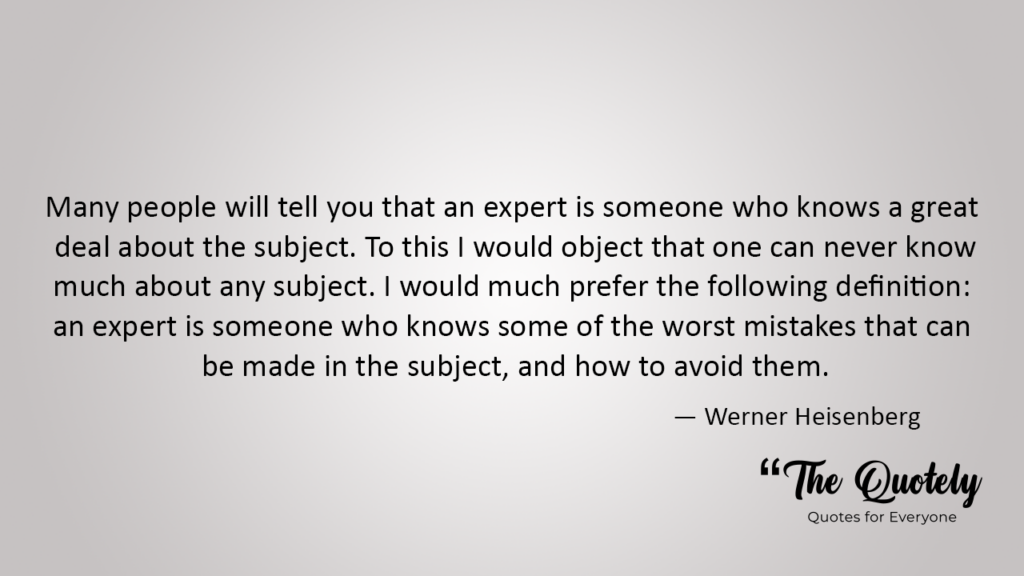
- Many people will tell you that an expert is someone who knows a great deal about the subject. To this, I would object that one can never know much about any subject. I would much prefer the following definition: an expert is someone who knows some of the worst mistakes that can be made in the subject, and how to avoid them. — Werner Heisenberg
Werner Heisenberg Quotes Atheist
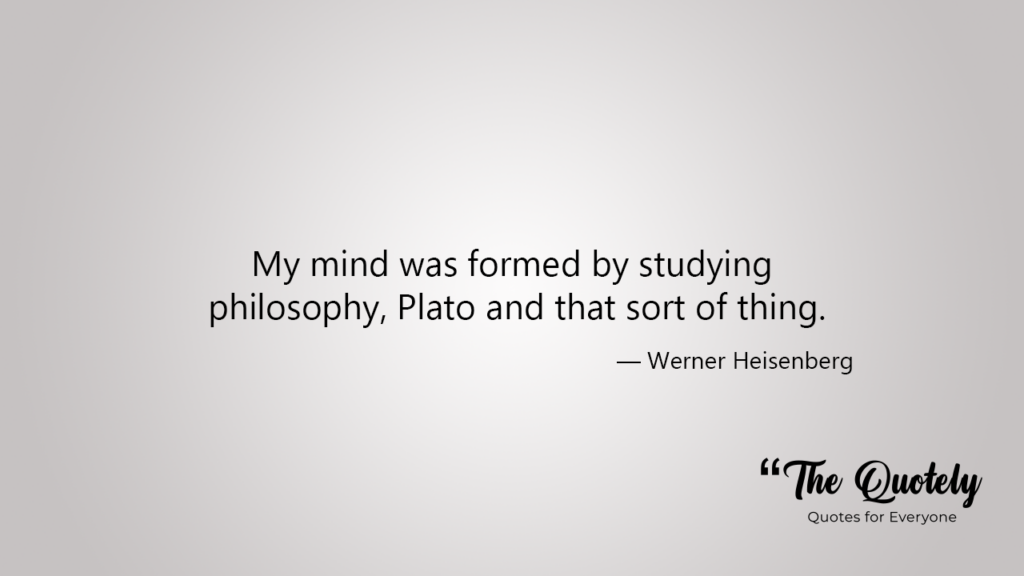
- “My mind was formed by studying philosophy, Plato, and that sort of thing.” ― Werner Heisenberg

- The ‘path’ comes into existence only when we observe it. — Werner Heisenberg
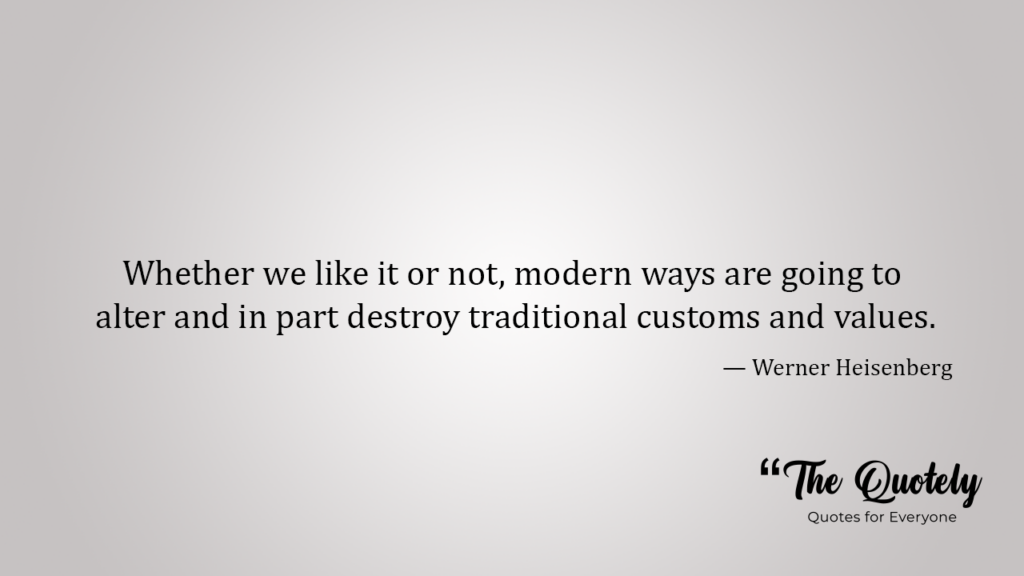
- “Whether we like it or not, modern ways are going to alter and in part destroy traditional customs and values.” ― Werner Heisenberg

- “In classical physics, science started from the belief – or should one say, from the illusion? – that we could describe the world, or least parts of the world, without any reference to ourselves.” ― Werner Heisenberg
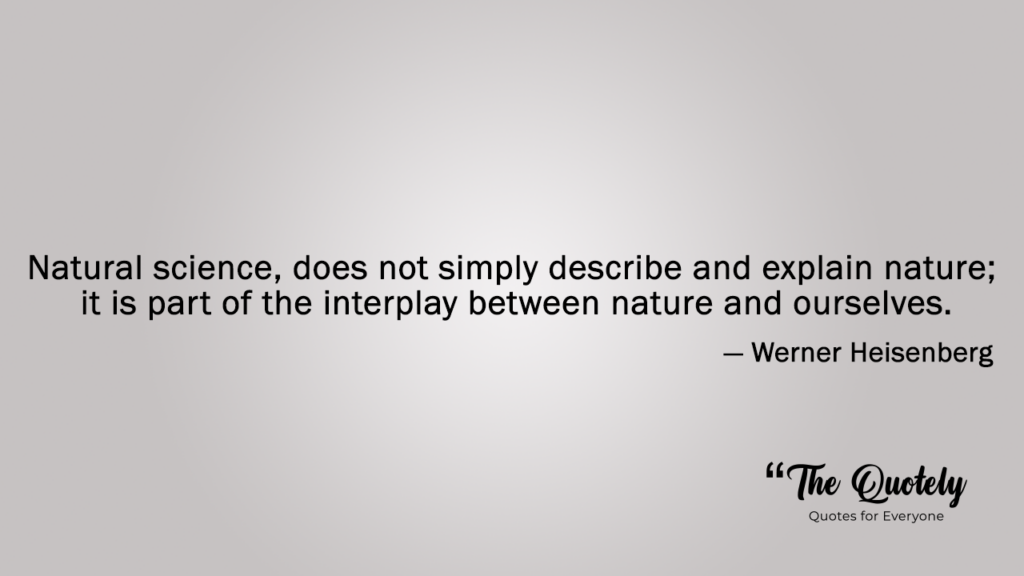
- “Natural science, does not simply describe and explain nature; it is part of the interplay between nature and ourselves.” ― Werner Heisenberg
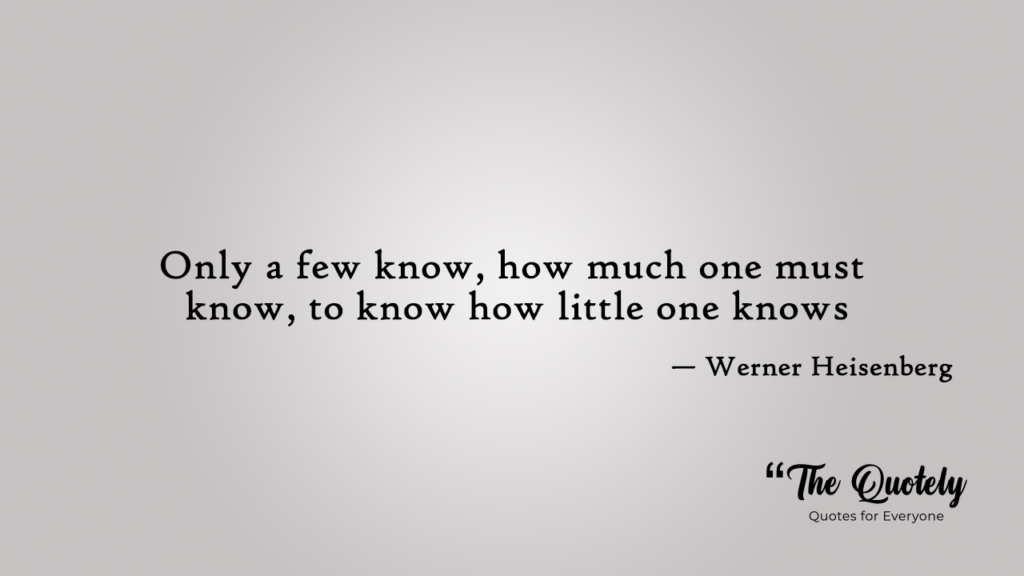
- “Only a few know, how much one must know, to know how little one knows” ― Werner Heisenberg
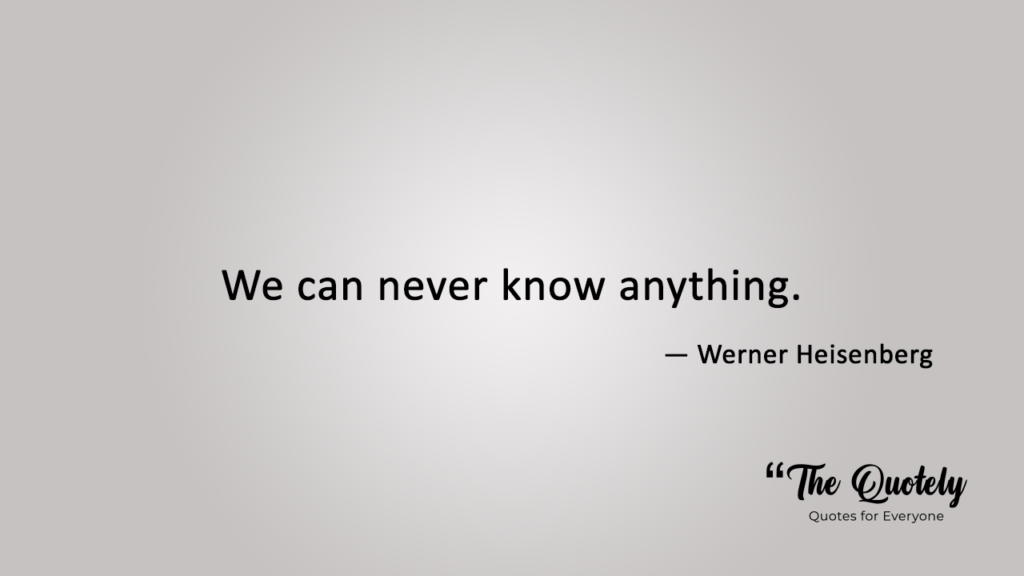
- “We can never know anything.” ― Werner Heisenberg
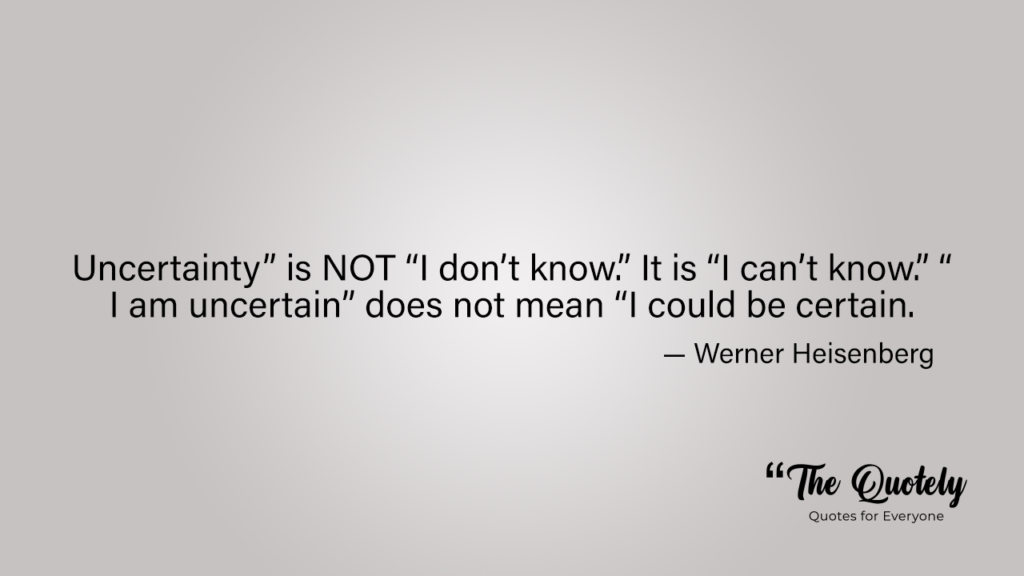
- “Uncertainty” is NOT “I don’t know.” It is “I can’t know.” “I am uncertain” does not mean “I could be certain.” — Werner Heisenberg
Don’t forget to explore our collection of William Shakespear Quotes, Mahatma Gandhi Quotes, and Abdul Sattar Edhi Quotes.
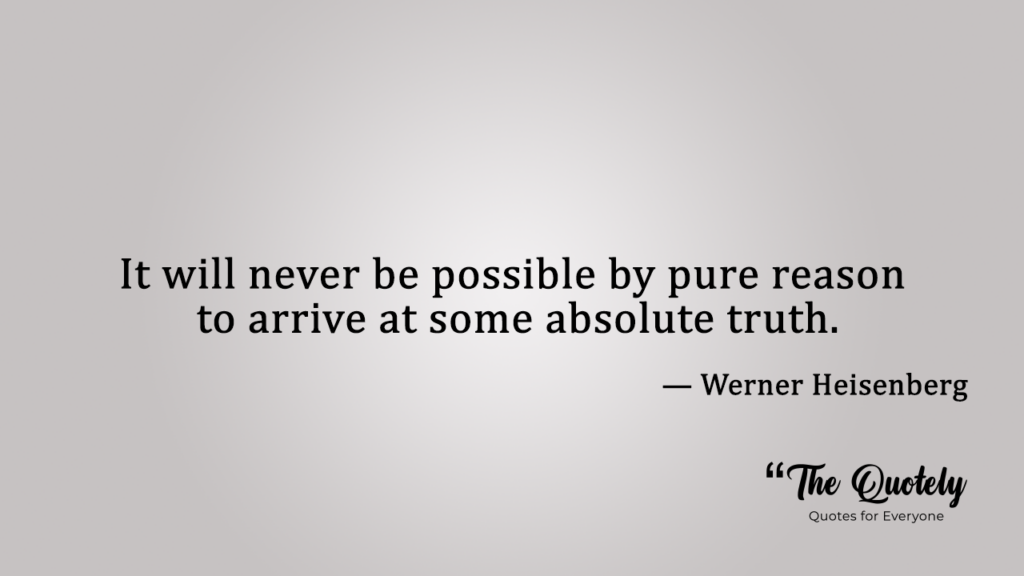
- It will never be possible by pure reason to arrive at some absolute truth. — Werner Heisenberg
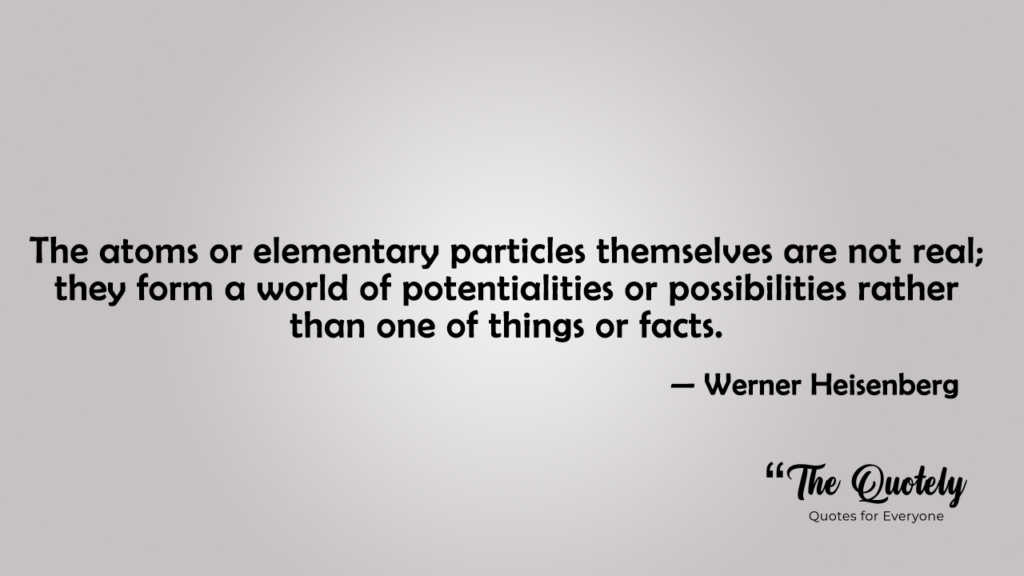
- The atoms or elementary particles themselves are not real; they form a world of potentialities or possibilities rather than one of things or facts. — Werner Heisenberg
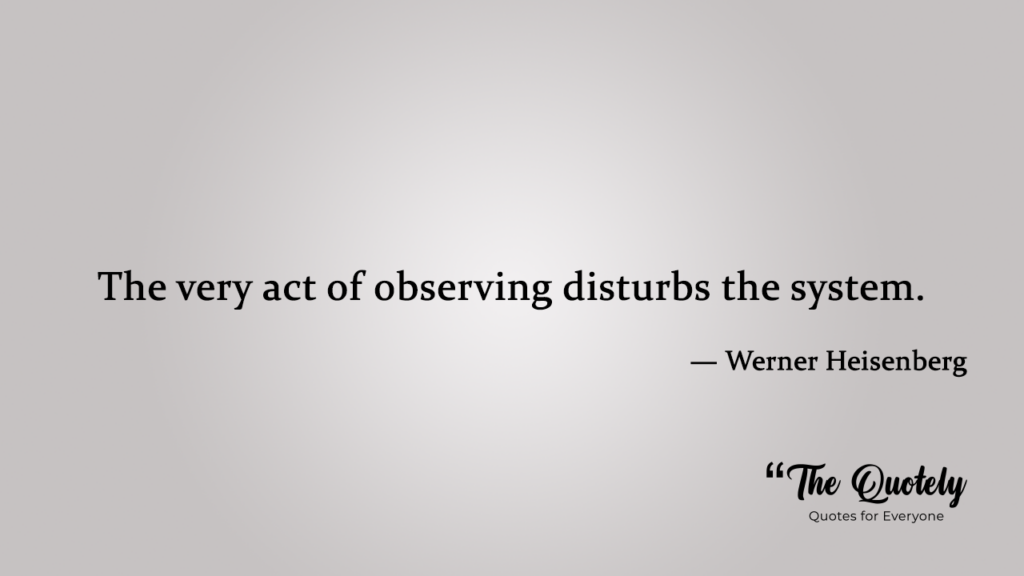
- The very act of observing disturbs the system. — Werner Heisenberg
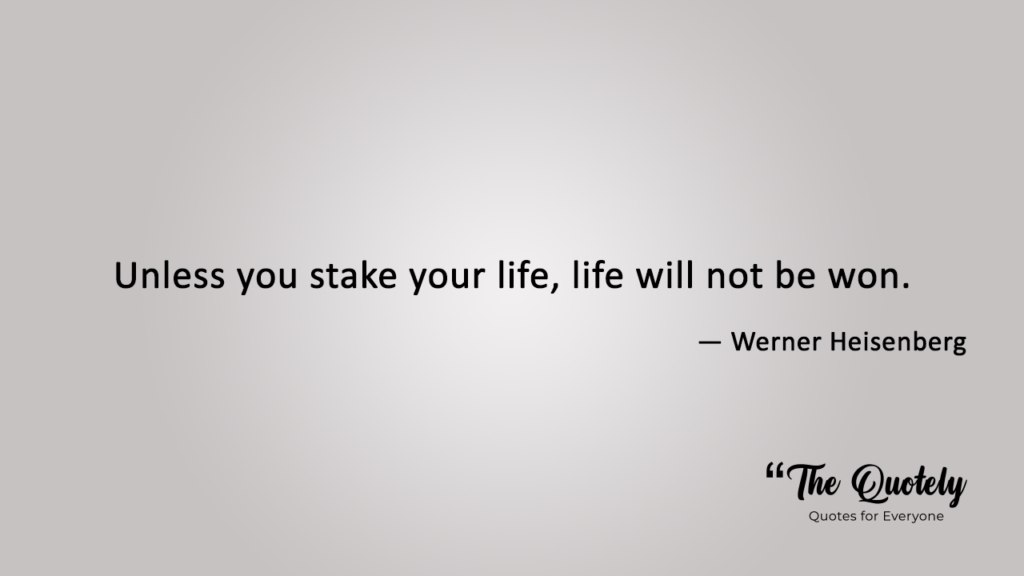
- Unless you stake your life, life will not be won. — Werner Heisenberg
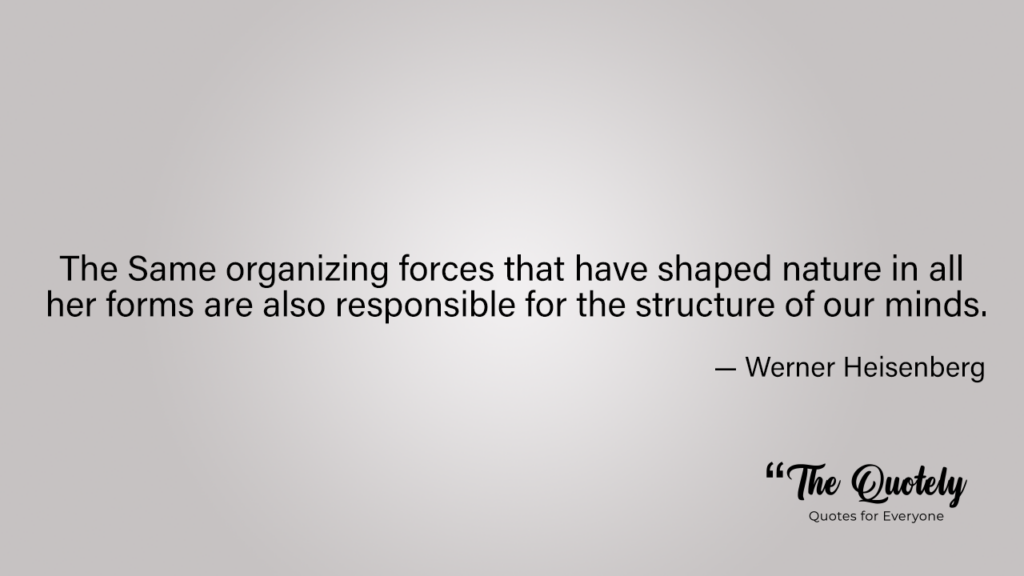
- The Same organizing forces that have shaped nature in all her forms are also responsible for the structure of our minds. — Werner Heisenberg
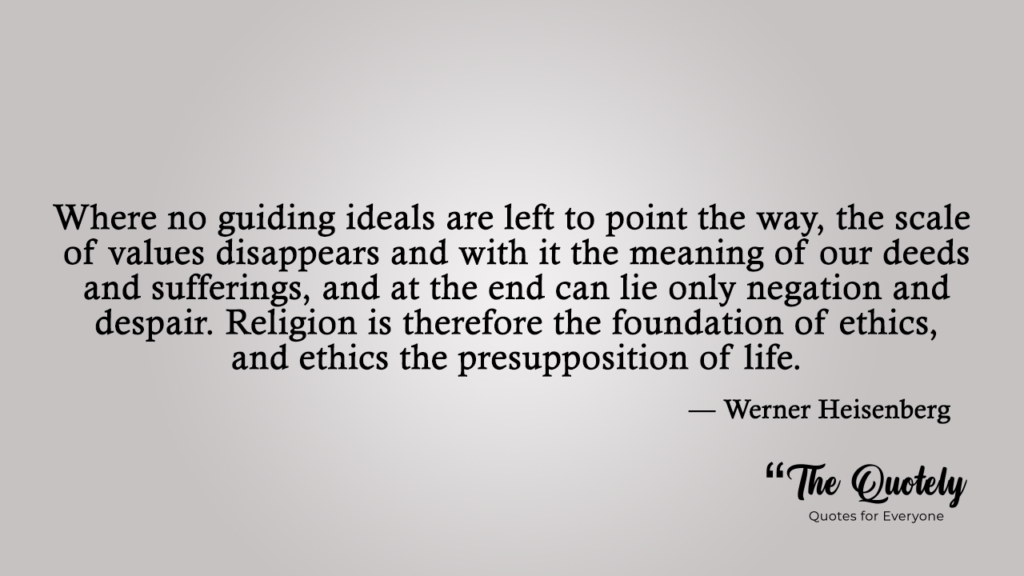
- Where no guiding ideals are left to point the way, the scale of values disappears, and with it, the meaning of our deeds and sufferings, and at the end can lie only negation and despair. Religion is therefore the foundation of ethics, and ethics is the presupposition of life. — Werner Heisenberg
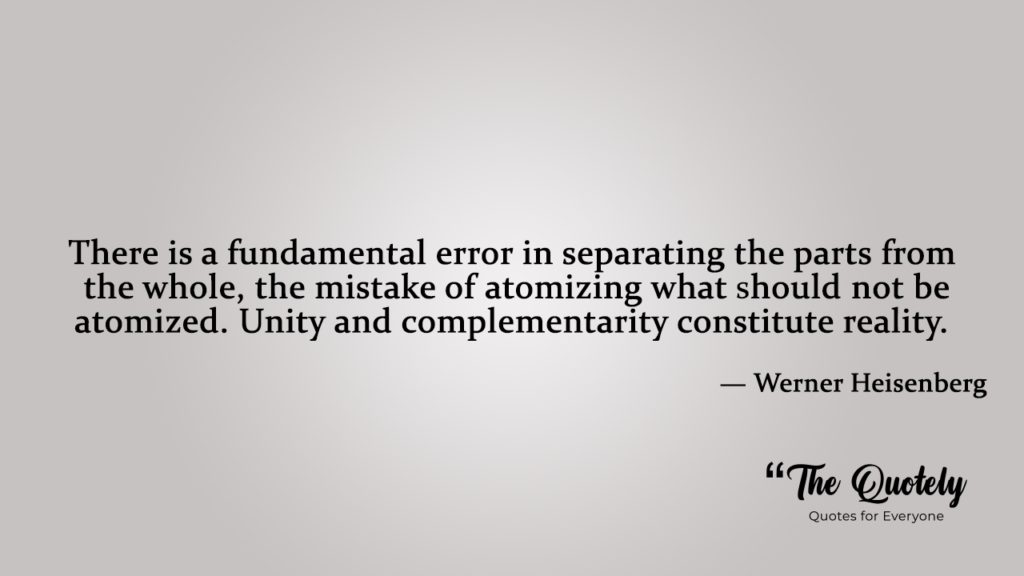
- There is a fundamental error in separating the parts from the whole, the mistake of atomizing what should not be atomized. Unity and complementarity constitute reality. — Werner Heisenberg

- The conception of objective reality … has thus evaporated … into the transparent clarity of mathematics that represents no longer the behavior of particles but rather our knowledge of this behavior. — Werner Heisenberg
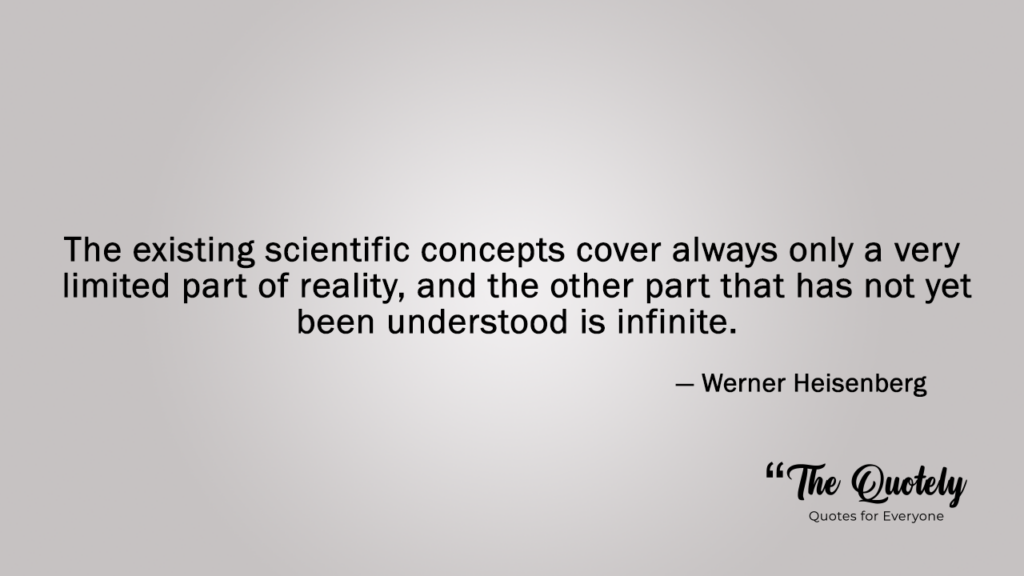
- The existing scientific concepts cover always only a very limited part of reality, and the other part that has not yet been understood is infinite. — Werner Heisenberg
Werner Heisenberg’s Famous Quotes
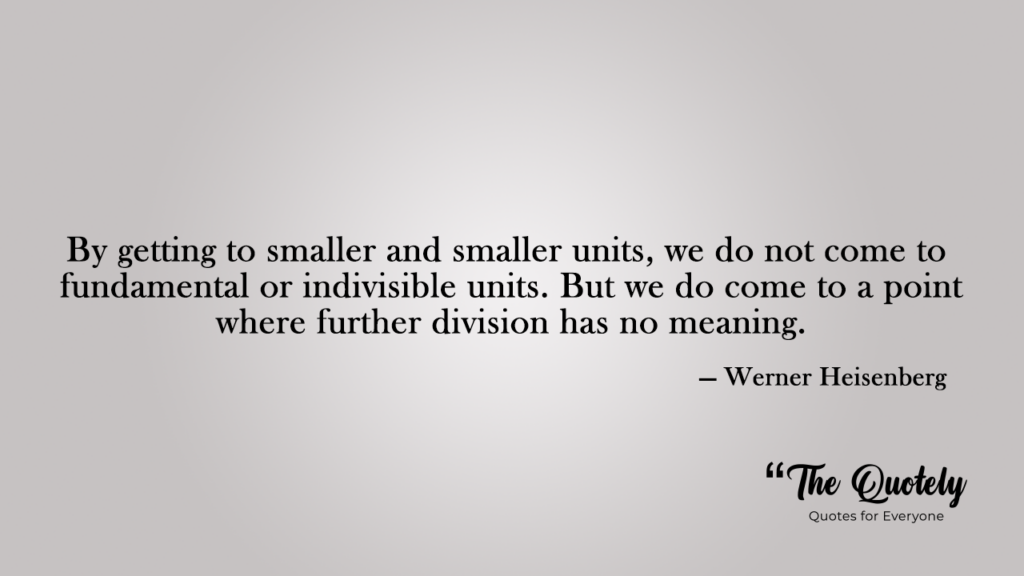
- By getting to smaller and smaller units, we do not come to fundamental or indivisible units. But we do come to a point where further division has no meaning. — Werner Heisenberg
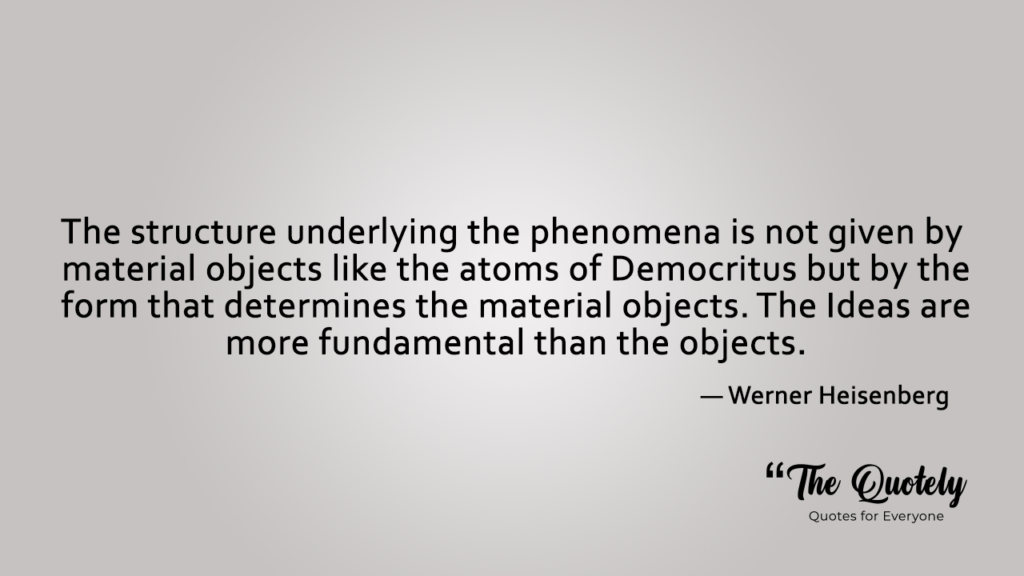
- The structure underlying the phenomena is not given by material objects like the atoms of Democritus but by the form that determines the material objects. Ideas are more fundamental than objects. — Werner Heisenberg
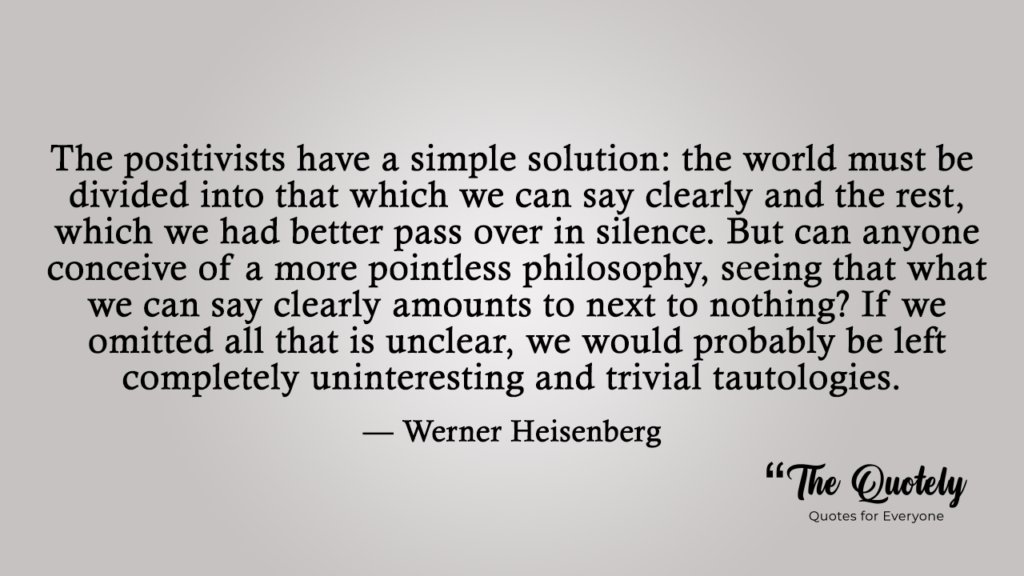
- The positivists have a simple solution: the world must be divided into that which we can say clearly and the rest, which we had better pass over in silence. But can anyone conceive of a more pointless philosophy, seeing that what we can say clearly amounts to next to nothing? If we omitted all that is unclear, we would probably be left with completely uninteresting and trivial tautologies. — Werner Heisenberg
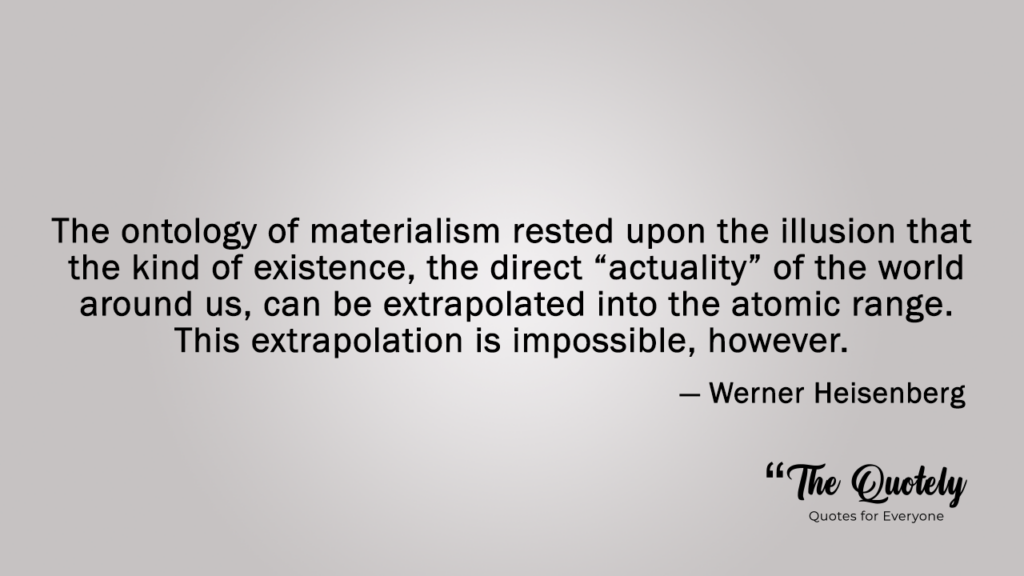
- The ontology of materialism rested upon the illusion that the kind of existence, the direct “actuality” of the world around us, can be extrapolated into the atomic range. This extrapolation is impossible, however. — Werner Heisenberg

- It was about three o’clock at night when the final result of the calculation [which gave birth to quantum mechanics] lay before me … At first I was deeply shaken … I was so excited that I could not think of sleep. So I left the house … and awaited the sunrise on top of a rock. — Werner Heisenberg
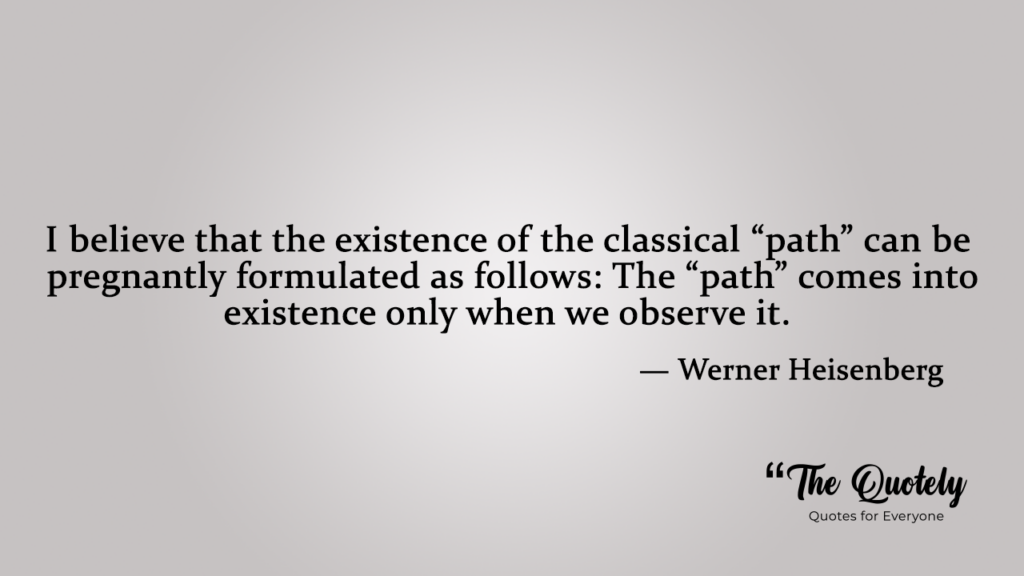
- I believe that the existence of the classical “path” can be pregnantly formulated as follows: The “path” comes into existence only when we observe it. — Werner Heisenberg
Heisenberg Quotes
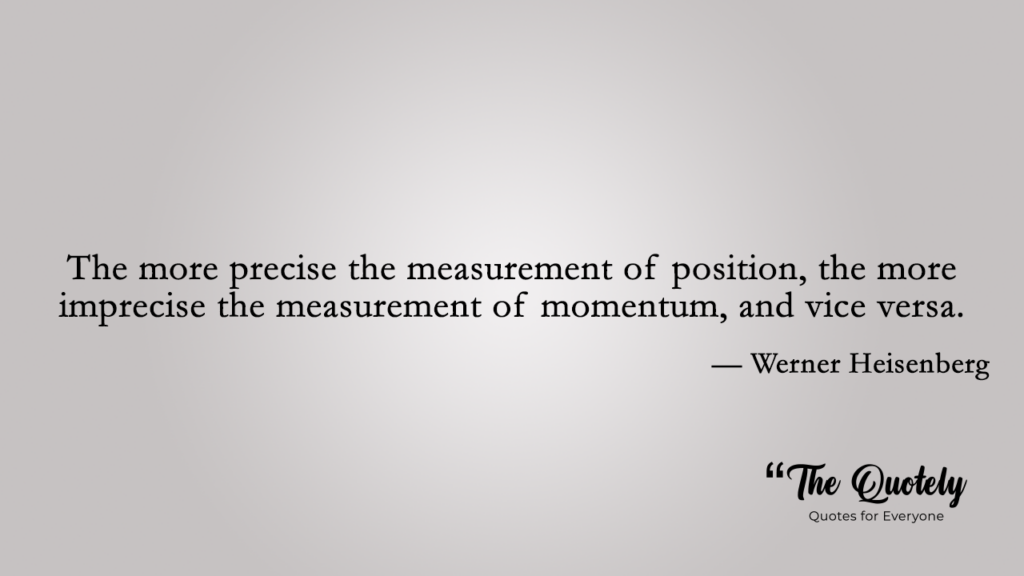
- The more precise the measurement of position, the more imprecise the measurement of momentum, and vice versa. — Werner Heisenberg
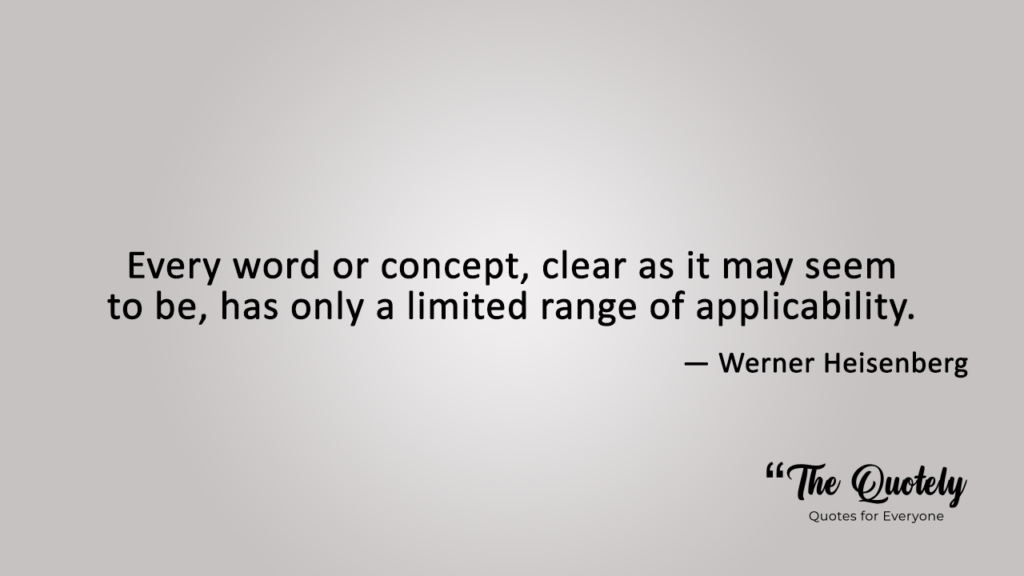
- Every word or concept, clear as it may seem to be, has only a limited range of applicability. — Werner Heisenberg
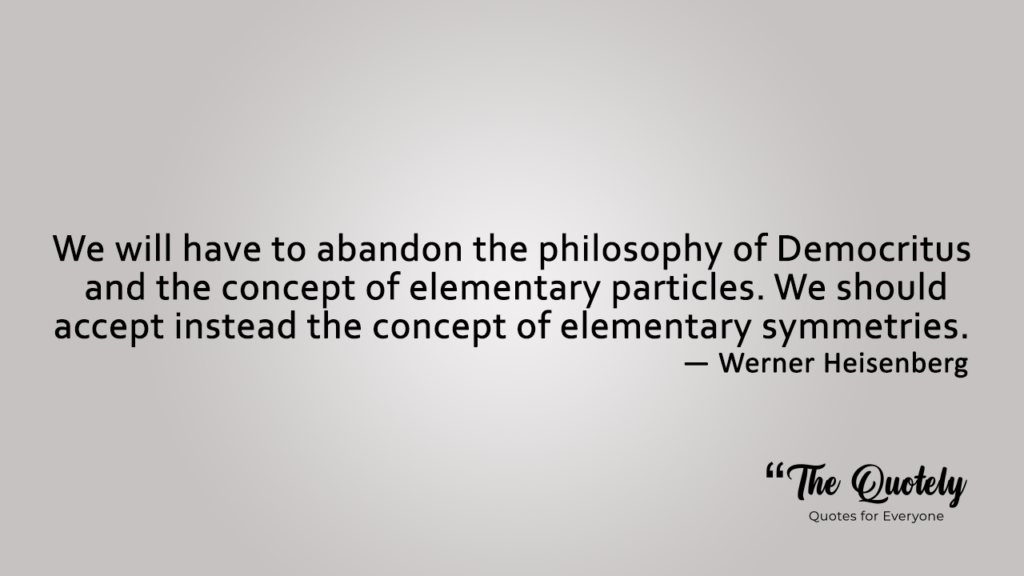
- We will have to abandon the philosophy of Democritus and the concept of elementary particles. We should accept instead the concept of elementary symmetries. — Werner Heisenberg
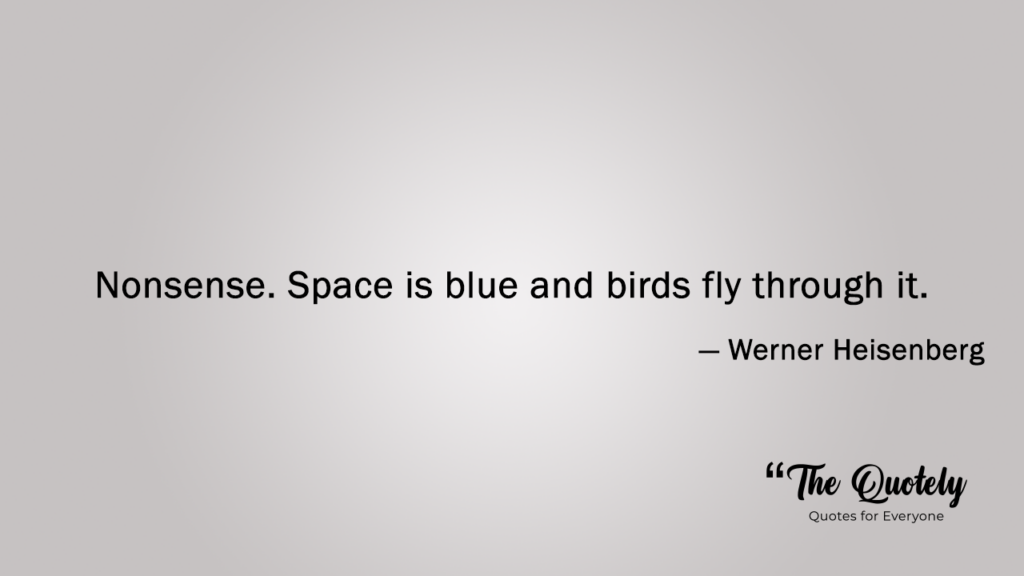
- Nonsense. Space is blue and birds fly through it. — Werner Heisenberg
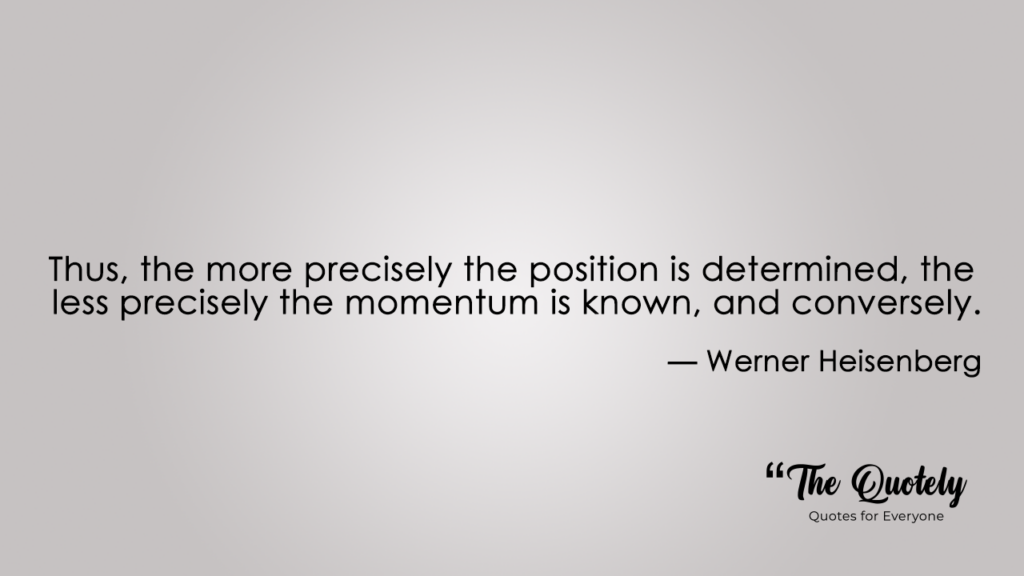
- Thus, the more precisely the position is determined, the less precisely the momentum is known, and conversely. — Werner Heisenberg
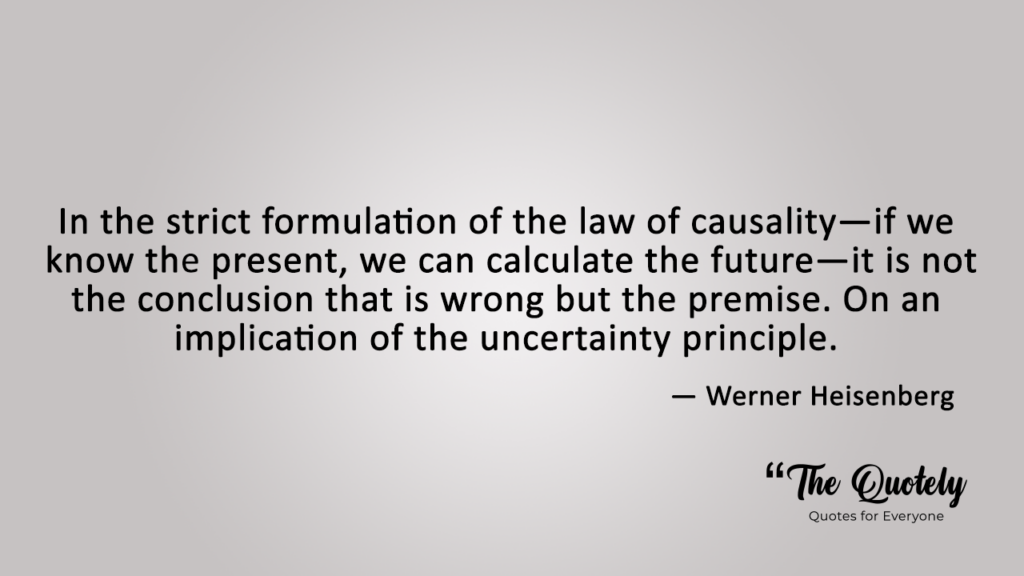
- In the strict formulation of the law of causality—if we know the present, we can calculate the future—it is not the conclusion that is wrong but the premise. On an implication of the uncertainty principle. — Werner Heisenberg
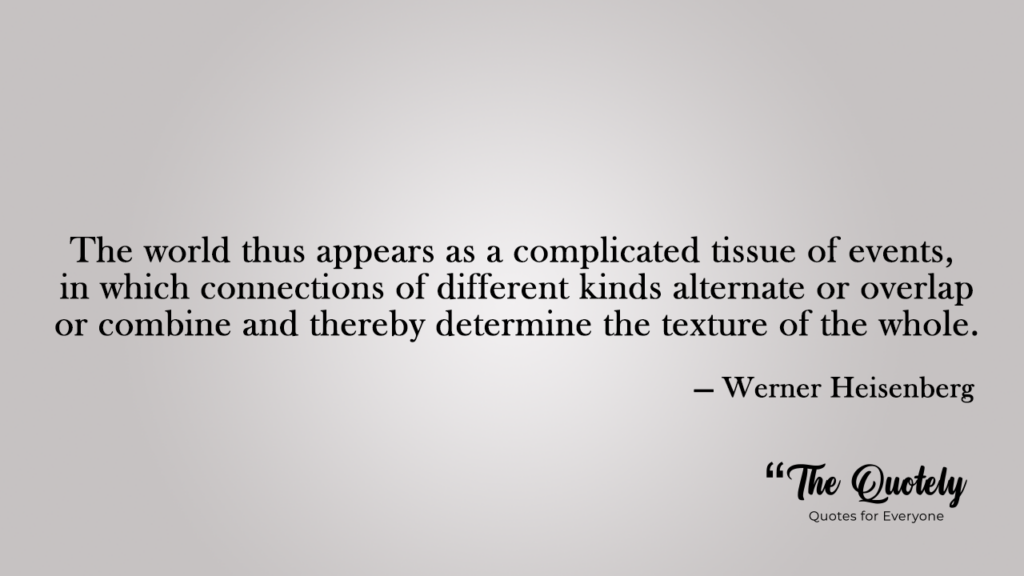
- The world thus appears as a complicated tissue of events, in which connections of different kinds alternate or overlap or combine and thereby determine the texture of the whole. — Werner Heisenberg
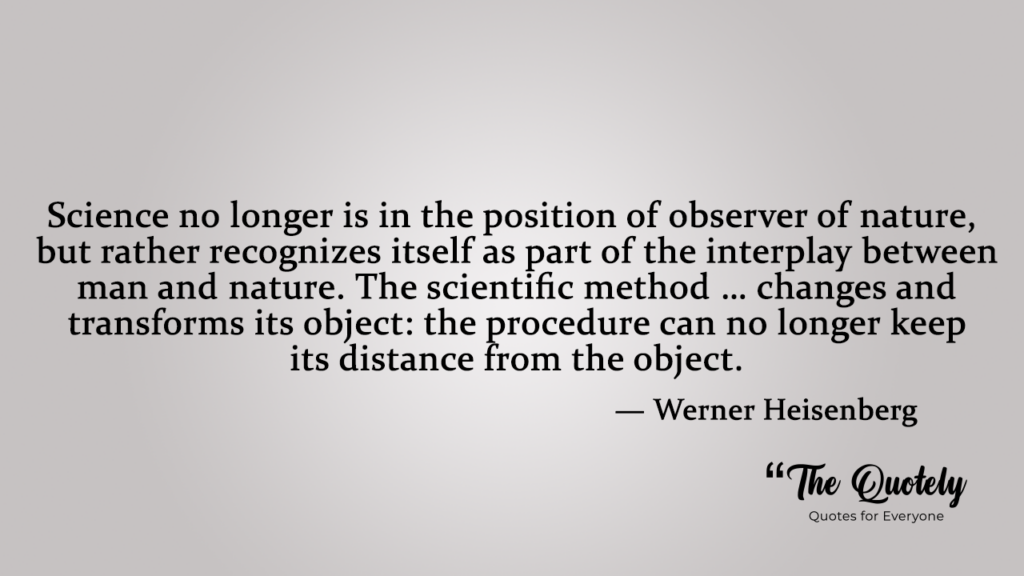
- Science no longer is in the position of observer of nature, but rather recognizes itself as part of the interplay between man and nature. The scientific method … changes and transforms its object: the procedure can no longer keep its distance from the object. — Werner Heisenberg
Werner Heisenberg Biography
Early Years and School
Werner Heisenberg was born on December 5, 1901, in Würzburg, Germany. His father was a well-known high school teacher. From 1920 to 1923, Heisenberg studied physics and math at the Ludwig-Maximilians-Universitat München and the Georg-August-Universitat Gottingen. In 1923, he earned his Ph.D.
Contributions
Werner Heisenberg’s influence on modern physics is on the same level as that of Niels Bohr, Paul Dirac, and Richard Feynman.
He was one of the most influential people in the history of quantum mechanics and how it is understood today. Heisenberg came up with the quantum theory of ferromagnetism, the neutron-proton model of the nucleus, and the S-matrix theory of particle scattering.
He is also known for making other important advances in quantum field theory and high-energy particle physics. Heisenberg was a very productive writer.
He wrote more than 600 original research papers, philosophical essays, and explanations for the general public. His work can still be found in the “Gesammelte Werke,” which has nine volumes (Collected Works).
Heisenberg is known for the so-called “uncertainty” or “indeterminacy” principle of 1927, one of the earliest breakthroughs in quantum mechanics, which he made in 1925, and the “world formula,” which is his idea for a unified field theory.
In 1932, when he was only 31, he won the Nobel Prize in Physics. During the worst years of Hitler’s rule, Heisenberg stayed in Germany and led the country’s research into how nuclear fission could be used during World War II.
He was also a very important part of putting West German science back together after the war. Heisenberg was a key part of the success of nuclear and high-energy physics research programs in West Germany.
Werner Heisenberg’s quotes about math, physics, and science are very popular.
Quantum Mechanics
Heisenberg spent six months at Max Born’s institute in Gottingen before he finished his studies in Munich in 1923.
Born had just started an ambitious program of research in atomic theory. He was looking at perturbation methods from celestial mechanics to try to solve many-body problems in atoms in the same way that they were solved in classical mechanics.
Because of this study, Heisenberg and Born worked together on the theory of the helium atom. Born also suggested that after Heisenberg finished his studies in Munich, he should come to Gottingen to work as his assistant.
Heisenberg’s doctoral exam, on the other hand, was almost a disaster. He didn’t know how to answer Wilhelm Wien’s questions about how well optical instruments could see details and how a storage battery works. Wien only let him go after his teacher, Somerfield, fought hard for him.
After this terrible event, Heisenberg was glad to get away to Gottingen, where he could work on atomic theory without any other distractions.
After publishing a paper in which he changed the rules of quantum theory to explain the strange Zeeman effect, he was able to become a lecturer in just a few months.
In September 1924, he stopped living in Gottingen and moved to Copenhagen, where Bohr had asked him to work with him on research.
Heisenberg’s research in Copenhagen was mostly about the quantum theory of radiation. Bohr, his Dutch assistant Hendrik Kramers, and a visiting American research fellow, John Slater, came up with a semi-classical theory that became known as the BKS theory.
But the idea soon ran into big problems and had to be thrown out.
Classical dispersion theory says that atoms react to electromagnetic fields by oscillating at the same frequency as the radiation they absorb or give off.
But such a theory couldn’t explain the quantum properties of the Bohr atom or the fact that radiation sometimes acts like particles.
The BKS change to classical dispersion theory was still classical in the sense that it assumed electromagnetic radiation was like a wave and didn’t involve quanta, but it did take quantum jumps into account.
The solution was a “virtual radiation field,” which was like a ghost field that held all the possible frequencies for the quantum transitions of an atom in a given stationary state.
Even though it went against well-known rules of physics like causality and energy conservation, the virtual field suggested a new mathematical way to connect the classical and quantum worlds.
Because of this, Born and Heisenberg looked at it very closely when Heisenberg went back to Gottingen. This was the idea that Heisenberg used to start thinking about quantum mechanics.
His paper “On a quantum theoretical reinterpretation of kinematical and mechanical relationships” was the most important thing he did for this program. It is now seen as a breakthrough in modern quantum mechanics.
Heisenberg’s paper was a big change from earlier attempts to solve problems with atoms by only using quantities that could be seen.
In a letter from July 9, 1925, he said, “All of my small efforts go toward getting rid of and replacing the idea of orbital paths that can’t be seen.”
In this way, his work went much further than Born’s attempts to make a quantum version of atomic mechanics. Heisenberg didn’t try to figure out the complicated mechanics of three-dimensional orbits.
Instead, he worked on the mechanics of a one-dimensional system that vibrates, called an anharmonic oscillator. And he looked at how the “virtual oscillators” of an atom led to the “observable quantities” (radiation frequencies) that BKS’s work said could be measured.
As a result, formulas were made that linked quantum numbers to the frequencies and intensities of radiation that could be seen.
Born saw that Heisenberg’s equations could be written in a short way using matrices. Because of this, the new idea also got the name “matrix mechanics.”
War years
After the start of the Second World War, the government agreed with Heisenberg’s ideas. The Ministry of Education gave him and Otto Hahn the job of scientific director of the Kaiser Wilhelm Institute of Physics in Berlin.
The Army Ordnance Office was in charge of the institute because it was so important to coordinating a secret war project.
Heisenberg, along with other nuclear scientists who called themselves the Uranium Club, started to look into how Hahn’s discovery of nuclear fission could be used in war.
Nuclear reactors could be used to power submarines, and a new bomb could be made that “surpasses the explosive power of the strongest explosive materials by several orders of magnitude,” as Heisenberg said in a report from December 1939.
Werner Heisenberg is known for his services in the field of physics.
Even now, physicists and historians of physics argue about what drove Heisenberg and what role he played in this work.
People had doubts about his character because he made deals with the Nazis, which may have made sense from a psychological point of view given how hard he tried to clear his name.
There have been thousands of pages written about “Heisenberg’s war,” but no one agrees on anything.
Later life and death
In his later years, Werner Heisenberg held a number of important jobs in Germany and other countries. He also gave important lectures on theoretical physics and other topics.
On February 1, 1976, he died of cancer of the kidneys and gall bladder. Heisenberg had lived for 74 years.





